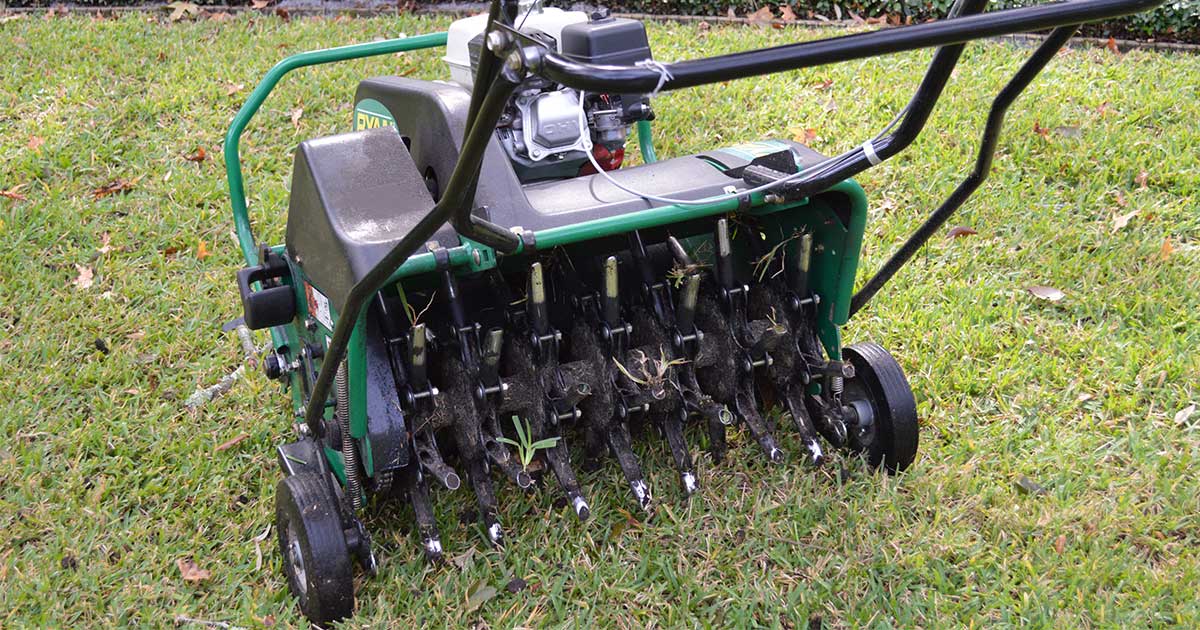Reasons to Aerate Your Lawn

Is your lawn beginning to thin and lose its vitality? After that burst of growth during the spring growing season and then surviving a hot, humid summer, your lawn has taken a beating. And a thin, faded lawn will stand out when you’re used to looking at thick, green turf. Even with proper fertilization, watering, and mowing, your lawn may not respond to these activities. You might not know what to do next, to try and improve the overall health of your lawn. That’s where aeration and overseeding come into the picture. Let’s talk about reasons to aerate your lawn and what it can do for turf revival.
Core aeration is when you use a machine which looks similar to a walk-behind mower called an aerator. It is used to go over the lawn and pull small soil cores or plugs. Those cores are then deposited on top of the lawn. These cores begin to decompose over the next week or so depending on rainfall. This breakdown of soil redeposits rich organic matter back into your lawn’s soil. While this process seems simple, it adds tons of benefits to your turf. First of all, it’s important to understand what lawns need to thrive. Lawn roots require oxygen, water, and nutrients for good growth. As a result of foot traffic and normal, everyday activity, your lawn soil can become compacted, which restricts oxygen, water, and nutrients from getting to roots.
Core aeration breaks up this compacted soil, allowing those three elements to continue nourishing your lawn roots again. Healthy soil is a big part of growing a great lawn. Aeration also assists in deeper turfgrass root establishment. Overseeding at this time is usually a great idea as well. For ideal seed germination, you need maximum seed to soil contact. When you aerate, you naturally create these pockets which allow for optimum seed to soil contact, boosting your seed germination results. This can help thicken up a thin or bare lawn, crowd out weeds, and create a healthier overall stand of turfgrass.
How Often Should I Aerate My Lawn? When it comes to aeration, how often you perform the service can be dependent on your soil type. Once a year or even twice a year is usually adequate for clay soils, depending on how compacted they are. Sandier or loam soils may not need to be aerated as much, due to porous nature which allows for better oxygen flow to the roots.
Can You Aerate Your Lawn Too Much? If you walk on your soil and it feels rock solid and is looking thin or patchy, these are signs that it could probably use aeration. But if your grass is healthy and thriving and hasn’t been impacted by a lot of equipment or foot traffic, it likely doesn’t need aeration. Once annually is usually enough in most cases, and for healthy lawns that receive regular maintenance and are performing well, every two to three years may be sufficient.
Best Time to Aerate and Overseed Lawn - The ideal time for aeration and overseeding your lawn will depend on your region and turf type. In the Northeast and Midwest, late summer (late August-early September) is a good time to aerate and overseed. For southern regions that experience cooler winters, the rules change a bit. Bermudagrass can be overseeded with perennial ryegrass in fall so that it doesn’t lose its lush appearance in winter. Zoysiagrass can be overseeded during its peak growing season -- late spring to late summer. Bahiagrass can be overseeded from spring to summer.
Aeration & Overseeding Mistakes to Avoid - When done correctly, aeration and overseeding can greatly benefit your lawn. Avoid common mistakes which will cost valuable time and money, along with not gaining maximum benefit from work done. Avoid these typical errors people tend to make when aerating and overseeding: 1. Using the wrong equipment. Spiked shoes don’t do the same thing as an aerator and can further compact your soil. A core or plug aerator is the tool professionals prefer for proper aeration that removes 2- to 3-inch soil plugs at half-inch diameter, approximately 2 to 3 inches apart. Using the wrong equipment or using equipment incorrectly can also damage your turf, so be mindful of proper operation by following instructions carefully. 2. Neglecting ideal timing. Respect the best time to aerate and overseed your lawn. One instance would beaerating and overseeding during dry periods. You will not be able to water sufficiently for maximum seed germination. 3. Lack of proper watering. Once you're done aerating and overseeding, you want to water your lawn and keep it evenly moist. If you have heavy clay soil, this will take longer than if you have sandy soil. For proper seed germination, it is recommended that you water 5-10 minutes in the morning and then again in the evening, until seedlings germinate. The goal is to keep your soil moist until those seeds germinate, which takes about 10 to 14 days. Once the seed germinate, you can reduce watering to once a day for approximately 20-25 minutes until the lawn is established, and then resume your regular watering schedule. 4. Lack of proper mowing. When seedlings first germinate, they are very tender, wait until seedlings are tall enough to mow. Make sure that your mower blade is sharp prior to mowing new seedlings. 2. Simultaneously trying to fight weeds while aerating and overseeding. When you’re growing turfgrass, you’re trying to build an ideal environment for seeds to germinate and establish. Weeds will get in the way of this process, but you should wait until after seed germination and after you’ve mowed about two to three times (approximately 4 to 6 weeks) before you can use any herbicide to try and control weeds.